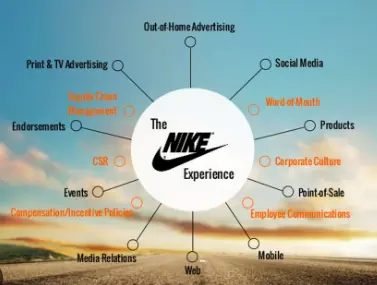Marketing Channel
Definition
Marketing channels are a path through which products or services are moved from the manufacturer or provider to the end customer.
Description
A marketing or distribution channel is a set of intermediaries or middlemen involved in delivering a product or service from the manufacturer or provider to the end customer.
Marketing channels can be direct or indirect and involve different intermediaries, such as wholesalers, retailers, agents, or brokers. The choice of marketing channel depends on various factors, such as the nature of the product or service, the target market, and the company’s marketing objectives.

Source: www.freepik.com
The main functions of marketing channels are to facilitate the exchange of goods and services, reduce the cost of distribution, and provide value-added services such as financing, storage, and transportation. Therefore, effective management of marketing channels is critical for achieving marketing success and satisfying customer needs.
Importance of Marketing Channel
- Improved reach: Marketing channels enable businesses to reach a wider audience and expand their customer base through intermediaries who have established relationships with customers in various markets.
- Greater efficiency: By using marketing channels, businesses can streamline their distribution processes and reduce costs associated with storing, shipping, and handling products.
- Enhanced customer experience: Marketing channels provide customers with access to various products and services and value-added services such as financing and customer support, improving their overall experience.
- Increased sales and revenue: Effective management of marketing channels can result in increased sales and revenue, as businesses can reach more customers and offer their products in a broader range of markets.
- Competitive advantage: A well-managed marketing channel can provide a competitive advantage by enabling businesses to differentiate themselves from their competitors and offer unique value to their customers.
Powerful Marketing Channels
These are the powerful marketing channels:
- Social media marketing: Social media platforms such as Facebook, Instagram, and Twitter offer businesses the ability to reach large audiences through targeted advertising and engaging content.
- Email marketing: Email marketing is a highly effective way to reach customers and promote products or services through personalised messaging and offers.
- Influencer marketing: Influencer marketing involves partnering with individuals who have a large following on social media or other platforms to promote products or services to their audience.
- Content marketing: Content marketing involves creating and sharing valuable, informative, and engaging content that attracts and retains a target audience.
- Search engine optimization (SEO): SEO involves optimising a website or online content to improve its ranking in search engine results pages and drive more traffic to a business’s website.
- Pay-per-click (PPC) advertising: PPC advertising involves paying for ad space on search engines, social media platforms, or other websites to drive traffic to a business’s website and increase sales.
- Affiliate marketing: Affiliate marketing involves partnering with other businesses or individuals to promote products or services and earn a commission on sales generated through their promotion.
How To Choose a Marketing Channel In 2023?
Choosing the right marketing channel in 2023 requires a strategic approach and consideration of several factors. Here are some steps to follow:
- Understand your target audience: Identify your target audience and their preferred communication and buying channels. Consider their demographics, behaviour, and preferences.
- Define your marketing goals: Determine your marketing objectives, such as increasing brand awareness, generating leads, or boosting sales, and align them with specific metrics to measure success.
- Evaluate your budget: Determine your available budget and the cost of implementing different marketing channels. Consider the ROI of each track and prioritise those that offer the highest potential return.
- Research your competition: Analyse and identify the marketing channels they are using successfully. Consider how you can differentiate yourself and offer unique value to your target audience.
- Test and measure: Experiment with different marketing channels and tactics and track their effectiveness using traffic, conversions, and revenue metrics. Adjust your approach based on the results and refine your strategy over time.
- Stay up-to-date: Keep abreast of industry trends and changes in consumer behaviour, and adapt your marketing strategy accordingly to stay relevant and practical.
Functions of Marketing Channels
Here are some functions of marketing channels presented in bullets:
- Facilitating the exchange process between producers and consumers.
- Providing a platform for products and services to be made available to customers.
- Creating efficiencies in the distribution process, reducing costs and increasing profitability.
- Offering value-added services such as financing, customer support, and after-sales service.
- Allowing for broader reach and greater market penetration by using intermediaries with established customer relationships in various markets.
- Providing market information to producers about consumer preferences, behaviour, and market trends.
- Allowing for differentiation and positioning of products through branding and marketing strategies.
- Providing a competitive advantage by enabling businesses to differentiate themselves from their competitors and offer unique value to their customers.
- Enabling businesses to establish and maintain customer relationships through direct and indirect communication channels.
Example:
Nike uses different marketing channels to reach and engage with its customers:

Source: www.google.com
- Retail stores: Nike operates worldwide, where customers can purchase its products and experience the brand firsthand.
- E-commerce: Nike also sells its products through its website, offering customers a convenient and direct way to purchase them.
- Social media: Nike uses social media platforms such as Instagram, Twitter, and Facebook to connect with customers, share its brand values, and promote its products through influencer partnerships and other marketing campaigns.
- Sponsorships: Nike sponsors various sports teams, athletes, and events, aligning its brand with high performance and athleticism.
- Advertising: Nike uses various forms of advertising, such as television commercials, billboards, and print ads, to promote its products and brand.
- Email marketing: Nike also uses email marketing to reach customers directly, offering personalised promotions and recommendations based on their previous purchases and browsing behaviour.
FAQs
What is a marketing channel?
A marketing channel is a set of intermediaries that a product or service goes through before it reaches the end customer. This can include wholesalers, retailers, distributors, and other intermediaries facilitating the exchange process between producers and consumers.
What are the functions of marketing channels?
Marketing channels perform various functions, such as facilitating the exchange process, creating efficiencies in distribution, providing value-added services, offering wider reach and greater market penetration, providing market information, enabling differentiation and positioning, and establishing relationships with customers.
What are the types of marketing channels?
There are two main types of marketing channels: direct and indirect. Direct marketing channels involve no intermediaries and enable producers to sell products directly to consumers. Indirect marketing channels involve intermediaries, such as wholesalers and retailers, that help distribute products to consumers.
How do you choose the right marketing channel for your business?
Choosing the right marketing channel depends on various factors, such as your product or service, target audience, budget, and marketing goals. It’s essential to conduct market research and analyse your options to determine which marketing channels will be the most effective for your business.
How do you measure the effectiveness of your marketing channels?
Measuring the effectiveness of your channels involves tracking metrics such as sales, customer acquisition costs, customer lifetime value, conversion rates, and return on investment (ROI). It’s important to regularly analyse and optimise your marketing channels to improve their effectiveness and drive sales.





We would love to have your opinion.